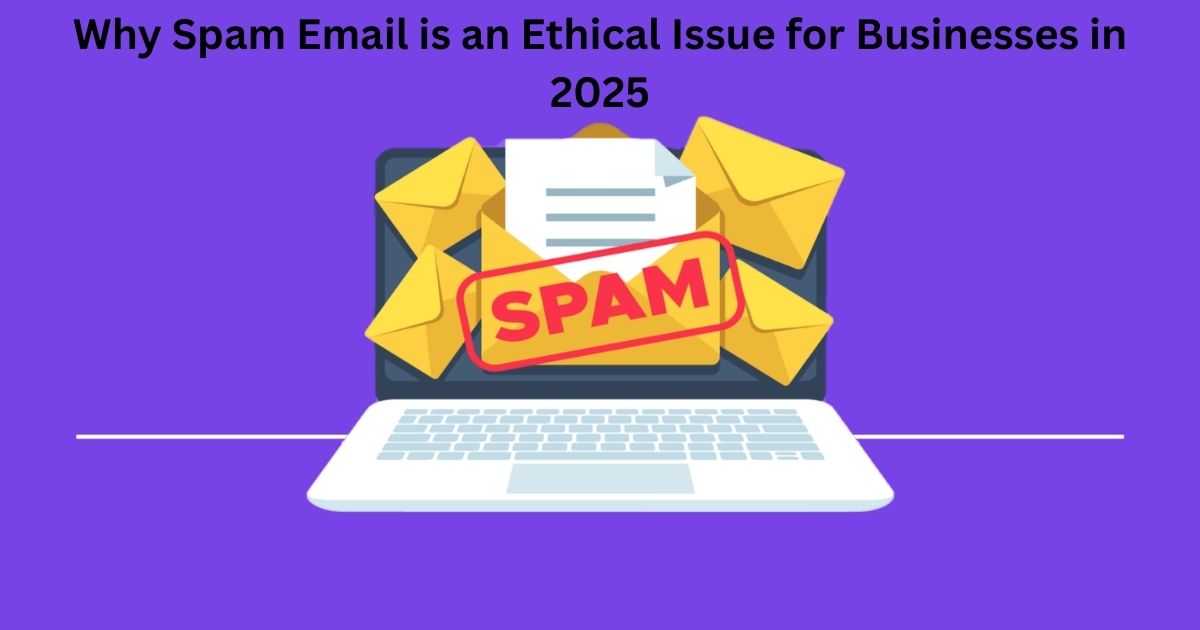Spam email, a persistent nuisance in the digital world, has been a major issue for businesses and individuals for years. According to recent studies, more than 50% of all emails sent worldwide are classified as spam. But beyond its annoyance, spam email raises significant ethical concerns.
In 2025, as businesses are more interconnected than ever, understanding the ethical implications of spam is crucial for maintaining trust, security, and reputation.
This article will dive into the ethical issues surrounding spam emails, explain why they pose risks to businesses, and explore the importance of ethical marketing practices to protect both consumers and organizations. By the end, you’ll have a deeper understanding of how spam can affect your business and why addressing this issue is paramount.
The Ethical Implications of Spam Email
What is Spam Email?
Spam emails, often referred to as junk emails, are unsolicited and often irrelevant messages sent in bulk. While spam can include a variety of content, including advertisements, phishing attempts, and malware, the common denominator is that it is sent without the consent of the recipient.
Typically, spam emails aim to promote products, services, or fraudulent schemes, exploiting email systems for marketing or malicious purposes.
The Growing Threat of Spam
Spam isn’t just an inconvenience; it’s a growing problem for businesses and individuals alike. With the rapid rise of digital marketing and e-commerce, spammers are finding new ways to exploit email systems.
According to cybersecurity experts, spam accounts for over 60% of global email traffic as of 2025. As spam volumes increase, so do the risks for businesses, including data breaches, decreased productivity, and damage to brand reputation.
Why Spam Email is an Ethical Issue
Spam email isn’t just an annoying issue; it’s an ethical problem. Here’s why:
1. Lack of Consent
The core ethical issue with spam emails is the absence of consent. When companies send unsolicited messages, they violate privacy rights. Sending an email without a person’s permission is a breach of trust and can tarnish the company’s image. Ethical marketing, on the other hand, relies on obtaining explicit consent from customers before sending communications.
2. Deceptive Practices
Spam emails often rely on deceptive tactics, such as misleading subject lines, fake offers, and counterfeit promotions, to trick recipients into opening them. These practices are unethical because they manipulate individuals into engaging with harmful or irrelevant content.
3. Phishing and Fraud
Spam emails are often used as vehicles for phishing attacks, where scammers impersonate legitimate businesses to steal personal information. These emails can lead to identity theft, financial loss, and severe consequences for both individuals and businesses. The ethical breach here is clear: spammers are exploiting trust for personal gain.
4. Impact on Resources
Sending and receiving spam emails consumes valuable resources. It wastes bandwidth, storage, and time. Businesses, in particular, are impacted by the increased load on their email servers, which can affect employee productivity and network security.
The Consequences of Ignoring Spam Ethics for Businesses

1. Reputation Damage
A business’s reputation is one of its most valuable assets. If a company is linked to spam, whether through direct involvement or being victimized by phishing scams, trust can erode quickly.
Customers are more likely to unsubscribe from or avoid companies that don’t take proper steps to avoid sending spam. Ethical issues related to spam can cause long-term damage to a business’s reputation.
Example:
A major e-commerce company faced significant backlash when its customer database was compromised due to a phishing email campaign. Despite their best efforts to warn customers, the company’s image was tarnished. Consumers were reluctant to engage with their emails, even after the incident was addressed.
2. Legal Consequences
Spam emails are also subject to laws and regulations in various regions. The CAN-SPAM Act of 2003 in the United States, GDPR in Europe, and other regulations worldwide impose strict penalties on companies that engage in or support spamming activities.
These laws mandate that businesses obtain explicit consent before sending promotional emails and that they include opt-out options. Violating these regulations can result in hefty fines and legal repercussions.
3. Customer Trust and Engagement
Ethical email marketing hinges on building trust with your audience. When customers receive unwanted or fraudulent emails, they may question your business practices. A loss of trust can severely impact customer engagement, loyalty, and sales.
Best Practices for Ethical Email Marketing
To avoid the ethical pitfalls associated with spam, businesses must adopt ethical email marketing strategies. Here are some best practices:
1. Obtain Explicit Consent
Always ensure that you have permission to send emails to individuals. Use opt-in methods, such as subscription forms or checkboxes, where users actively agree to receive communications from your company.
2. Provide Clear Opt-Out Options
Give recipients the option to easily unsubscribe from email lists. Making it difficult for customers to opt out is not only unethical but can also be legally problematic.
3. Be Transparent About Your Intentions
Always be honest about why you’re emailing someone. Don’t use misleading subject lines or false promises. Transparency helps to build trust with your audience.
4. Personalize Your Emails
Instead of sending generic, mass-produced emails, personalize your communication based on customer preferences and behavior. This ensures your emails are relevant and valuable to the recipient.
5. Use a Double Opt-In Process
A double opt-in ensures that a user explicitly confirms their subscription to your mailing list. This prevents spam and protects users from unwanted emails.
The Future of Spam Email and Ethical Business Practices
As the digital landscape continues to evolve, so too will the challenges surrounding spam emails. Emerging technologies, like artificial intelligence and machine learning, can help businesses combat spam more effectively.
Additionally, more stringent regulations are expected globally to combat unethical email practices. Companies that prioritize ethics in their email marketing and communication efforts will be better positioned to maintain trust and engagement with their audiences.
Conclusion:
Spam emails represent a significant ethical issue that businesses must address to protect their reputation, resources, and customer trust. By adopting ethical email marketing practices, such as obtaining consent, being transparent, and complying with regulations, businesses can safeguard themselves against the harmful effects of spam.
In 2025, as the digital world becomes more interconnected, ethical email practices will be more crucial than ever. What do you think? Share your thoughts in the comments below! Subscribe for more insights on tech and ethical business practices.
FAQs
What makes spam email unethical?
Spam email is unethical because it is unsolicited, deceptive, and often manipulative, leading to privacy violations and trust issues.
How can spam emails harm my business?
Spam can damage your business reputation, reduce customer trust, and expose your organization to legal and cybersecurity risks.
What is the best way to prevent spam emails in my business?
Implement clear consent mechanisms, provide easy opt-out options, and ensure transparency in your email marketing practices to avoid spam. For more business-related information check the internetverizons.
